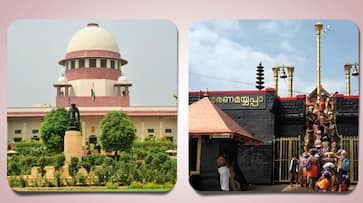The Supreme Court on Wednesday said that it cannot hear all 55 review petitioners in the Sabarimala temple case, and will restrict itself to eight to nine petitioners
New Delhi: The Supreme Court on Wednesday started hearing 65 petitions on Sabarimala including 55 review petitions, four writ petitions, two transfer petitions, two special leave petitions (SLP) and one petition seeking time.
The petitions are heard by a five-judge constitution bench led by Chief Justice Ranjan Gogoi. Justices Rohinton Nariman, AM Khanwilkar, DY Chandrachud and Indu Malhotra are part of the bench.
Chief Justice Gogoi on January 15 stated that Indu, the lone woman judge of the bench considering the case, is on medical leave and so the case would be heard on February 6.
K Parasaran, appearing for the Nair Service Society, began arguments for reviewing the Sabarimala verdict, which allows women of all ages to enter the famous shrine in Kerala.
"Sabarimala custom cannot be equated to untouchability, it is only a religious custom," Parasaran argued.
Senior advocate V Giri then commenced his arguments and said Lord Ayyappa has special character - celibate. The character of the deity has to be protected. Exclusionary practice is in consonance with the character of the deity. Untouchability has nothing to do with custom, he added.
As per latest reports, the Supreme Court said that it cannot hear all 55 review petitioners in the Sabarimala temple case, and will restrict itself to eight to nine.
Meanwhile, the Kerala government changed its statement on the number of women who entered the Sabarimala temple. In the Assembly meeting on Monday, Devaswom minister Kadakampally Surendran said that as per the report of the Sabarimala executive officer, only two women entered the shrine.
Surendran also said that there is still no confirmation on whether a Sri Lankan entered the shrine or not. As per the Kerala government's earlier reports, at least 51 women, under the age of 50, had entered the Sabarimala shrine in this season.
One of the review pleas said that the verdict "without holding that the questions raised related to matters of religion which are not within judicially manageable standards, the majority decision in substance has the effect of holding that the character of the deity can be altered based on individual faith and belief, in violation of the tenets of a particular religion and or religious sect".
Last Updated Feb 6, 2019, 2:12 PM IST









![Salman Khan sets stage on fire for Anant Ambani, Radhika Merchant pre-wedding festivities [WATCH] ATG](https://static-gi.asianetnews.com/images/01hr1hh8y86gvb4kbqgnyhc0w0/whatsapp-image-2024-03-03-at-12-24-37-pm_100x60xt.jpg)
![Pregnant Deepika Padukone dances with Ranveer Singh at Anant Ambani, Radhika Merchant pre-wedding bash [WATCH] ATG](https://static-gi.asianetnews.com/images/01hr1ffyd3nzqzgm6ba0k87vr8/whatsapp-image-2024-03-03-at-11-45-35-am_100x60xt.jpg)


